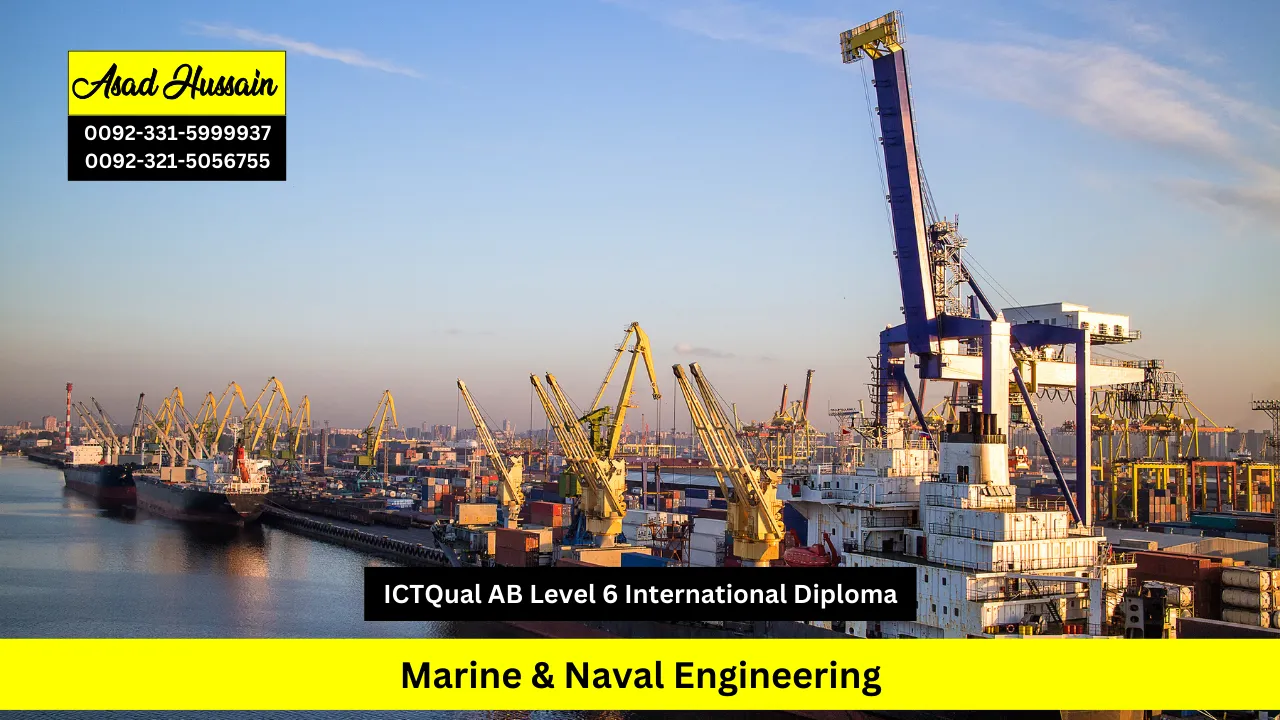The maritime and naval engineering industry is a cornerstone of global trade, defense, and marine technology, driving innovation in ship design, propulsion, and naval operations. The ICTQual AB Level 6 International Diploma in Marine & Naval Engineering is designed to equip learners with the advanced knowledge, technical expertise, and practical skills required to excel in this dynamic and essential sector. This programme is ideal for both freshers and professionals seeking to build or advance their careers in marine and naval engineering.
Over ICTQual AB Level 6 International Diploma in Marine & Naval Engineering of three years, learners will complete 360 credits, covering core principles of marine engineering, ship construction, naval architecture, propulsion systems, maritime safety, and naval operations management. ICTQual AB Level 6 International Diploma in Marine & Naval Engineering combines rigorous theoretical instruction with hands-on practical applications, ensuring learners develop the competence to address real-world challenges in marine and naval environments. Emphasis is placed on problem-solving, project management, and the use of modern marine engineering technologies to prepare graduates for both commercial and defense maritime sectors.
Learners completing ICTQual AB Level 6 International Diploma in Marine & Naval Engineering will acquire specialized skills in ship design, propulsion efficiency, marine systems maintenance, and naval operations. They will also develop the ability to implement innovative engineering solutions, ensure operational safety and compliance with international maritime standards, and contribute effectively to multidisciplinary engineering teams. ICTQual AB Level 6 International Diploma in Marine & Naval Engineering opens doors to diverse career opportunities, including naval engineering, shipbuilding, offshore operations, marine project management, and research and development in marine technologies.
Enrolling in the ICTQual AB Level 6 International Diploma in Marine & Naval Engineering ensures learners gain a globally recognized certification, a strong foundation in marine engineering principles, and practical expertise, positioning them for professional success in the competitive and evolving maritime industry.
Program Highlights
Study Units
This qualification, the ICTQual AB Level 6 International Diploma in Marine & Naval Engineering, consists of 36 mandatory units.
Year 1 – Foundation in Marine & Naval Engineering
- Principles of Marine and Naval Engineering
- Engineering Mathematics
- Fundamentals of Mechanical and Electrical Engineering
- Materials Science and Engineering
- Engineering Drawing and Computer-Aided Design (CAD)
- Introduction to Fluid Mechanics and Hydrodynamics
- Basics of Marine Propulsion Systems
- Naval Architecture – Fundamentals
- Marine Structures and Ship Construction
- Health, Safety, and Environmental Practices in Maritime Engineering
- Communication and Technical Report Writing
- Introduction to Project Management in Engineering
Year 2 – Intermediate Studies in Marine & Naval Engineering
- Marine Hydrodynamics and Stability
- Marine Propulsion and Power Systems
- Structural Analysis and Ship Design
- Offshore and Coastal Engineering – Fundamentals
- Marine Electrical and Control Systems
- Materials and Corrosion in Marine Environments
- Marine Maintenance and Reliability Engineering
- Computational Methods in Naval Architecture
- Sustainable Maritime Engineering and Green Technologies
- Applied Research Methods in Marine Engineering
- Port and Harbour Engineering – Basics
- Project Planning and Marine Operations Management
Year 3 – Advanced Studies in Marine & Naval Engineering
- Advanced Ship Design and Modelling
- Advanced Propulsion and Power Plant Systems
- Offshore Structures and Subsea Engineering
- Advanced Hydrodynamics and Computational Fluid Dynamics (CFD)
- Naval Defence Systems and Military Applications
- Smart Marine Technologies and Industry 4.0
- Robotics and Autonomous Systems in Maritime Engineering
- Cyber-Physical Systems and IoT in Marine Engineering
- Professional Ethics and Sustainability in Marine & Naval Engineering
- Innovation and Entrepreneurship in Marine Technology
- Infrastructure and Facility Planning for Maritime Systems
- Final Year Major Project (Capstone Project)
The ICTQual AB Level 6 International Diploma in Marine & Naval Engineering is designed for learners who wish to pursue advanced knowledge and skills in marine and naval engineering. To ensure success in this comprehensive programme, candidates must meet the following entry requirements. These criteria help ensure learners have the foundational knowledge, experience, and skills needed to fully benefit from the course.
Age Requirements
- Learners must be at least 18 years old at the time of enrolment
- There is no upper age limit, allowing both young learners and experienced professionals to apply
Educational Requirements
- A minimum of a high school diploma or equivalent qualification is required
- Preferred candidates may have completed prior technical or engineering-related qualifications, such as a Level 5 Diploma in Marine Engineering, Mechanical Engineering, or Naval Architecture
- Knowledge in mathematics, physics, and basic engineering principles is advantageous
Professional Experience
- For experienced learners, a minimum of 2–3 years of verifiable work experience in marine engineering, naval operations, or related industries is recommended
- Fresh learners with little or no professional experience are welcome but will be required to complete all course assignments and practical assessments to demonstrate competence
English Language Proficiency
- Learners must demonstrate proficiency in English, both written and spoken
- Acceptable evidence includes a recognized English language qualification (e.g., IELTS 5.5 or equivalent) or proof of prior education in English
Enrolling in this programme ensures that learners have the necessary academic background, professional experience, and language skills to successfully complete the ICTQual AB Level 6 International Diploma in Marine & Naval Engineering and excel in the global marine and naval industry.
The ICTQual AB Level 6 International Diploma in Marine & Naval Engineering provides learners with an in-depth, internationally recognized qualification in marine and naval engineering. Over three years and 36 mandatory units, learners will gain comprehensive theoretical knowledge, practical skills, and professional competence to excel in maritime, naval, and offshore engineering sectors. The learning outcomes are specific, measurable, and aligned with industry standards to ensure graduates are fully prepared for real-world engineering challenges.
Year 1 – Foundation in Marine & Naval Engineering
Principles of Marine and Naval Engineering
- Understand core principles and terminology in marine and naval engineering
- Explain the operational functions of marine systems and naval vessels
- Apply foundational concepts to solve basic marine engineering problems
- Recognize trends and innovations in maritime technology
Engineering Mathematics
- Solve engineering problems using advanced mathematical techniques
- Apply calculus, linear algebra, and statistics to marine engineering scenarios
- Model marine and naval systems mathematically and interpret results
- Develop analytical and problem-solving skills for maritime applications
Fundamentals of Mechanical and Electrical Engineering
- Describe mechanical and electrical systems used in ships and naval vessels
- Apply principles of mechanics and circuits to marine engineering problems
- Analyze system performance through practical exercises
- Integrate mechanical and electrical components in basic ship designs
Materials Science and Engineering
- Identify and classify materials used in shipbuilding and marine structures
- Explain material properties and their suitability for marine applications
- Apply knowledge of materials for corrosion resistance and durability
- Conduct practical tests on material performance in maritime environments
Engineering Drawing and Computer-Aided Design (CAD)
- Produce technical drawings and schematics for marine engineering projects
- Create 2D and 3D models of ship components using CAD software
- Interpret technical drawings for manufacturing and maintenance purposes
- Develop spatial reasoning and visualization skills in design
Introduction to Fluid Mechanics and Hydrodynamics
- Explain fundamental fluid mechanics principles affecting ship design
- Analyze basic hydrodynamic forces acting on marine structures
- Apply calculations for buoyancy, drag, and flow characteristics
- Conduct simple hydrodynamic simulations for practical learning
Basics of Marine Propulsion Systems
- Identify key components and operation of ship propulsion systems
- Understand energy transfer, thrust, and fuel efficiency in marine engines
- Apply basic calculations for power and propulsion performance
- Conduct simple practical exercises to understand system operation
Naval Architecture – Fundamentals
- Understand ship design principles, stability, and hull forms
- Apply naval architecture concepts to basic vessel calculations
- Analyze ship performance based on design parameters
- Develop foundational design skills for marine vessels
Marine Structures and Ship Construction
- Describe primary and secondary structural components of ships
- Analyze structural loads, stress, and strain in marine vessels
- Apply basic shipbuilding techniques in practical exercises
- Understand compliance with safety and regulatory standards
Health, Safety, and Environmental Practices in Maritime Engineering
- Understand maritime safety regulations and standards
- Identify potential hazards and implement safety measures
- Apply environmental best practices in marine engineering
- Develop awareness of occupational health requirements in the maritime sector
Communication and Technical Report Writing
- Produce structured technical reports for marine engineering projects
- Present engineering findings in written and oral formats
- Apply effective communication techniques for professional settings
- Demonstrate proficiency in documentation standards and reporting
Introduction to Project Management in Engineering
- Explain project management principles for marine engineering projects
- Develop project plans, schedules, and resource allocation strategies
- Apply tools and techniques to manage small-scale projects
- Evaluate project outcomes and implement improvement strategies
Year 2 – Intermediate Studies in Marine & Naval Engineering
Marine Hydrodynamics and Stability
- Analyze ship stability, buoyancy, and hydrodynamic performance
- Apply calculations for metacentric height and stability criteria
- Use simulation tools to model vessel behavior in different sea conditions
- Evaluate stability and safety measures for marine vessels
Marine Propulsion and Power Systems
- Understand advanced marine propulsion technologies
- Analyze engine performance, fuel efficiency, and power generation
- Apply thermodynamic principles to marine power systems
- Conduct practical exercises to optimize propulsion performance
Structural Analysis and Ship Design
- Perform structural calculations for ship components under various loads
- Design basic ship structures following engineering principles
- Apply safety and regulatory standards to design and analysis
- Use computational tools for structural evaluation
Offshore and Coastal Engineering – Fundamentals
- Understand principles of offshore structures and coastal protection
- Apply design concepts for piers, jetties, and offshore platforms
- Evaluate environmental impacts on marine infrastructure
- Conduct basic structural and hydrodynamic assessments
Marine Electrical and Control Systems
- Describe shipboard electrical and control systems
- Analyze system performance and troubleshoot faults
- Apply knowledge in practical exercises for ship operations
- Integrate control systems with mechanical and propulsion systems
Materials and Corrosion in Marine Environments
- Understand corrosion mechanisms and protection methods
- Evaluate material selection for durability in saltwater conditions
- Apply coatings and corrosion control techniques
- Conduct tests to assess material performance in marine environments
Marine Maintenance and Reliability Engineering
- Develop maintenance plans and reliability strategies for ships
- Apply inspection and preventive maintenance techniques
- Analyze system failures and implement corrective actions
- Conduct practical exercises for reliability assessment
Computational Methods in Naval Architecture
- Use computational tools for ship design and performance evaluation
- Apply numerical methods for stability, hydrodynamics, and structures
- Interpret simulation results to optimize vessel design
- Develop practical skills in software-based marine engineering analysis
Sustainable Maritime Engineering and Green Technologies
- Explore environmentally sustainable practices in marine engineering
- Analyze technologies for emissions reduction and energy efficiency
- Apply sustainable design principles in vessel construction and operations
- Assess environmental impact and lifecycle of maritime projects
Applied Research Methods in Marine Engineering
- Develop research proposals and methodologies for marine projects
- Collect, analyze, and interpret data effectively
- Apply statistical and analytical tools to research findings
- Present research in a structured and professional manner
Port and Harbour Engineering – Basics
- Understand port design, operations, and infrastructure planning
- Apply basic principles of harbor engineering and maintenance
- Evaluate operational efficiency and safety standards
- Conduct practical assessments of port and harbor facilities
Project Planning and Marine Operations Management
- Develop project plans for marine and naval engineering operations
- Apply resource management, scheduling, and risk assessment tools
- Monitor project performance using key performance indicators (KPIs)
- Evaluate operational outcomes and recommend improvements
Year 3 – Advanced Studies in Marine & Naval Engineering
Advanced Ship Design and Modelling
- Apply advanced ship design principles to complex vessels
- Use modeling software for hull design, stability, and performance evaluation
- Analyze structural and hydrodynamic interactions in vessel design
- Conduct design simulations to optimize ship performance
Advanced Propulsion and Power Plant Systems
- Understand high-performance marine propulsion and power plants
- Analyze thermodynamic cycles and efficiency of power systems
- Apply calculations for thrust, fuel consumption, and system optimization
- Conduct practical exercises for propulsion system evaluation
Offshore Structures and Subsea Engineering
- Understand design and operation of offshore platforms and subsea systems
- Apply engineering principles to offshore structural analysis
- Evaluate environmental and operational risks for offshore projects
- Conduct practical assessments in offshore engineering scenarios
Advanced Hydrodynamics and Computational Fluid Dynamics (CFD)
- Apply advanced hydrodynamics principles in ship and offshore design
- Use CFD tools to simulate fluid flow and performance of marine vessels
- Optimize hull forms and resistance characteristics using computational analysis
- Interpret results to implement practical design improvements
Naval Defence Systems and Military Applications
- Understand naval defense technology and military vessel design
- Analyze weapon, sensor, and communication integration in naval vessels
- Apply design and operational principles in defense applications
- Evaluate effectiveness and safety of military marine systems
Smart Marine Technologies and Industry 4.0
- Explore smart shipping technologies and digitalization in marine engineering
- Apply IoT, automation, and data-driven systems in maritime operations
- Optimize vessel performance and efficiency through digital tools
- Assess the impact of Industry 4.0 innovations in marine engineering
Robotics and Autonomous Systems in Maritime Engineering
- Understand robotics applications for autonomous ships and unmanned systems
- Apply control systems and sensors for autonomous navigation
- Conduct practical simulations for autonomous maritime operations
- Evaluate safety, efficiency, and operational performance of robotic systems
Cyber-Physical Systems and IoT in Marine Engineering
- Integrate IoT and cyber-physical systems in maritime operations
- Monitor vessel performance and predictive maintenance using connected systems
- Apply data analytics for operational decision-making
- Conduct practical exercises in smart ship technologies
Professional Ethics and Sustainability in Marine & Naval Engineering
- Apply ethical standards in engineering decision-making
- Promote sustainable design, construction, and operational practices
- Evaluate environmental and social impacts of marine engineering projects
- Implement professional responsibility in maritime operations
Innovation and Entrepreneurship in Marine Technology
- Develop innovative solutions for maritime engineering challenges
- Apply entrepreneurship principles in marine technology ventures
- Conduct feasibility and market analysis for new projects
- Present professional proposals for marine innovation initiatives
Infrastructure and Facility Planning for Maritime Systems
- Understand planning and management of marine infrastructure
- Apply principles for port, shipyard, and naval base design
- Evaluate operational efficiency and safety of maritime facilities
- Conduct practical planning exercises for maritime systems
Final Year Major Project (Capstone Project)
- Conduct an independent, comprehensive marine or naval engineering project
- Apply research, design, and technical skills to solve real-world problems
- Demonstrate project management, analytical, and professional competencies
- Present and defend project findings to academic and industry evaluators
This structured learning outcome framework ensures that graduates of the ICTQual AB Level 6 International Diploma in Marine & Naval Engineering acquire a robust combination of theoretical knowledge, practical skills, and professional competence, preparing them for careers in marine design, naval operations, offshore engineering, project management, and advanced maritime technologies worldwide.
The ICTQual AB Level 6 International Diploma in Marine & Naval Engineering is designed for learners who wish to develop advanced skills and knowledge in marine and naval engineering. This programme is suitable for both freshers and professionals aiming to build or advance their careers in maritime, naval, and offshore engineering.
Learners Passionate About Marine and Naval Engineering
- Individuals with a strong interest in ships, naval architecture, and maritime technologies
- Learners motivated to understand vessel design, propulsion systems, and marine operations
- Those eager to explore offshore structures, hydrodynamics, and maritime safety systems
Engineering Graduates or Diploma Holders
- Graduates or diploma holders in Mechanical Engineering, Naval Architecture, or related fields
- Learners seeking specialization in marine and naval engineering technologies
- Those aiming to strengthen their practical and theoretical knowledge in ship design and marine systems
Professionals Seeking Career Advancement
- Professionals working in marine engineering, naval operations, or shipbuilding industries
- Individuals looking to enhance qualifications for technical leadership or managerial roles
- Learners aiming to stay competitive in the evolving maritime and offshore sector
Learners Interested in Research and Innovation
- Those focused on R&D in marine technologies, autonomous vessels, and smart maritime systems
- Learners who want to apply analytical and problem-solving skills to maritime engineering challenges
- Individuals interested in sustainable marine engineering practices and green technologies
Aspiring Leaders and Managers in Marine Engineering
- Individuals aiming for leadership roles in shipyards, ports, naval operations, or offshore projects
- Learners seeking to develop project management, strategic planning, and decision-making skills
- Those wishing to influence maritime policies, safety standards, and engineering innovation
This programme equips learners with the technical expertise, practical skills, and professional competence necessary to excel in marine and naval engineering and positions them for success in a competitive global maritime industry.
As an approved centre of ICTQual AB, learners must enrol with us to pursue the ICTQual AB Level 6 International Diploma in Marine & Naval Engineering. There are two certification routes depending on the learner’s experience
Route for Experienced Professionals
- Provide proof of at least 6 years of verifiable professional experience
- Certain assignments may be waived based on prior experience
- Complete the relevant assessments and assignments as determined by ICTQual AB
- Receive guidance and support throughout the certification process
- Successfully demonstrate knowledge and practical skills through assessments
On completion, receive the ICTQual AB Level 6 International Diploma in Marine & Naval Engineering
Route for Fresh Candidates
- Complete all 36 assignments included in the programme
- Receive continuous assessment and constructive feedback
- Gain practical and theoretical knowledge in marine and naval engineering
- Demonstrate skills and understanding through assignments and assessments
- Participate in guided learning and support throughout the programme
- On successful completion, receive the ICTQual AB Level 6 International Diploma in Marine & Naval Engineering
As an approved centre of ICTQual AB, learners must enrol with us to gain this globally recognized certification. Both routes equip learners with practical, technical, and managerial skills essential for success in the marine and naval sector. Learners will develop expertise in ship design, naval architecture, propulsion systems, offshore engineering, marine structures, and port operations, enabling them to take on leadership, engineering, and project management roles in the global maritime industry.







